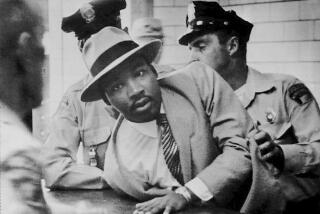Jordan’s King Hussein
- Share via
The death of King Hussein of Jordan brought back memories of five days I spent as a Times reporter covering the then-young monarch’s visit to Southern California, in April 1959. King Hussein was only 24 at the time.
“This has been one of the most exciting experiences of my life,” exclaimed the king with a huge grin as he climbed out of a needle-nosed Lockheed F-104D jet fighter at the Lockheed facility airport at Palmdale. King Hussein had just landed the jet after a 33-minute flight at speeds of 1,520 mph, 49,000 feet above the Mojave Desert. It was his first supersonic flight.
“The king is an excellent pilot,” insisted U.S. Air Force Capt. Roger N. Mercer, co-pilot on the flight. And, indeed he was. King Hussein was checked out to fly jets, helicopters and conventional planes. I remember Hussein as a bright, friendly, down-to-earth young man. For the next 40 years I followed his career as he played a major role as a peacemaker in the turbulent Middle East, recalling that day long ago when he became the fastest flying king in the world.
CHARLES HILLINGER
Rancho Palos Verdes
*
The laudatory comments about King Hussein are all well and good, but history is somewhat tortured to claim that he always fought for peace (“Rule Marked by Battles, Yet He Fought for Peace,” Feb. 8). Hussein was an Arab leader, however, who came to realize that he could get more by peaceful means than by war. Some say he was pushed by his perhaps more aggressive Arab neighbors, but he still felt that Israel must go. Only after a series of defeats in war did he begin to see what he should do.
When Hussein’s forces captured the so-called West Bank and annexed it to Jordan they destroyed and desecrated most Jewish sites. In the 1967 war he was begged by Israel to stay out, but he may have felt pressured to enter--and lost again. If he had stayed out, the West Bank would still be under Jordanian occupation. May King Hussein rest in peace; he learned a lot and changed a great deal.
EMIL SCHAFER
Riverside
*
The world mourns the death of the Jordanian king. While he is due a certain amount of respect for some good that he did in recent years, one should not forget that this same person was an ally of Iraq during the Gulf War; that he killed 20,000 Palestinians during the 1970 “Black September”; that he joined Egypt and Syria in 1967 to “push Israel into the sea”; that after his forces retreated in the 1967 war, written orders were found directing them to kill every man, woman and child of two villages in the Jerusalem area; that tombstones of the cemetery on the Mount of Olives were desecrated and used as latrines for the Jordanian army. Should we fly flags at half-mast for him?
URI HIRSCH
Los Angeles
More to Read
Sign up for Essential California
The most important California stories and recommendations in your inbox every morning.
You may occasionally receive promotional content from the Los Angeles Times.










